We designed Epic Card Game with a basic framework of mechanical rules:
- You draw one card on your turn and none on your opponent’s turn.
- You play one card per turn.
- You may only play champions on your turn.
- Cards are played from your hand.
- Champions must deploy for a turn before attacking.
- Champions can be targeted, broken, banished, blocked, and/or returned to a player’s hand.
- Cards don’t do anything after they are put into the discard pile.
After that, we made a bunch of cards and abilities that allow you to break this framework of rules as you’re playing. Breaking these rules are some of the most powerful things you can do in Epic, and exploiting that rule-breaking expertly is one of the biggest keys to winning games of Epic.
For this installment of Breaking the Rules, I’m going to talk about Hand Size.
Hand Size
One of the basic rules of Epic is that you start with a hand size of five cards and at the end of your turn you must discard down to seven cards. Another is that you draw one card per turn, but only on your turn. Yet you get one gold to spend every turn: yours and your opponent’s.
The basic math of this can lead you to mid-game disaster. If you play one card with every one of the gold available to you without drawing any extra cards, you will quickly run out of cards in your hand. If you went first, you will draw back up to four cards on turn two, three on turn three, two on turn four, and then be out of cards in your hand by the end of turn four. This math gets even more problematic if you play any free cards. Even only playing one free card for every gold you spend you would be out of cards by the end of your second turn.
This is a problem on a basic level, because if your opponent can and is playing cards and you are not, they will almost certainly win the game, and probably quite quickly.
This is only half the story, however. Since every card in Epic is powerful and there are limits to how many you can play, card selection is one of the most powerful aspects of the game. If we each only have one gold to spend, but I have five choices on what to spend my gold on and you only have one card to choose, then chances are good that I will be able to play a card that is more powerful for the current situation than you will be able to. Furthermore, if I can steadily be playing free cards in addition to using my gold and you only have enough cards to just play one card per turn, that’s another huge advantage for me.
The answer to this dilemma is to draw lots of extra cards to keep your hand size high, enabling you to have a good selection of cards to spend your gold on and to play free cards without running out of cards in your hand. The tricky part is finding ways to do this without losing critical game tempo to your opponent. While it’s usually fine to spend a turn and a gold here and there to play a draw two card and increase your hand size slightly, your opponent has free rein to do as they like that turn, unopposed by anything in your hand.
As a result, it’s usually preferable to try and keep your hand size high while also being able to interact with your opponent and the game that’s unfolding. One way to do this is to play cards that allow you to replace them in your hand with a new card, while also advancing your position in the game. Good examples are champions like Sea Hydra, Blue Dragon, Zealous Necromancer, and Succubus. Also, events like Draka’s Fire, Helion’s Fury, Quell, and Banishment. As the game progresses and you get some cards into your discard pile, free cards can do the same thing using recycle: cards like Faithful Pegasus, Word of Summoning, Ogre Mercenary, and Fumble.
While cards like these are valuable in helping you maintain your hand size and not run out of cards to play, they alone aren’t enough to get you a significantly bigger card selection and to allow you to play many powerful cards that don’t replace themselves with a new card in your hand.
This makes cards that affect the game while actually increasing your hand size some of the most powerful cards in the game. Cards like Raging T-Rex, Erase, Ceasefire, and The Gudgeon.
While cards like that are obviously powerful card advantage right when you play them, there are several cards that can provide a major boost your hand size over time if played correctly. Cards like Muse, Noble Unicorn, Ancient Chant, Winter Fairy, Crystal Golem, and Keeper of Secrets.
Crystal Golem can block your opponent’s most dangerous attacker and then draw you two cards. If you have cards like Final Task, Necromancer Lord, Corpse Taker,or Army of the Apocalypse, you can do it again, steadily growing your hand size while being able to throw the golem into the fray.
A normal draw two card increases your hand size by one; if you recall an Ancient Chant from your discard pile, you increase your hand size by two. If you play a Chant from your hand and then play a recycle card for free to banish it, you also increase your hand size by two. If you play a Noble Unicorn on your opponent’s turn and then play a Good draw two on your turn, you increase your hand size by two thanks to the extra draw from the Unicorn’s ally ability.
When you increase your hand size by two, you not only give yourself better card selection for future plays, but you greatly reduce the downside of occasionally playing a card like Drain Essence or Flame Strike, which doesn’t replace itself with a new card in your hand.
There are other benefits to keeping your hand size high. If your opponent is playing with cards like Psionic Assault or Thought Plucker, they won’t be nearly as powerful against you. If you draw a card like Soul Hunter, you can get it into play without spending a gold by getting your hand size above seven and then discarding the card at the end of your turn.
It’s important to realize that advantage in Epic isn’t just gained on the battlefield and on the scoreboard, being ahead on cards in hand is also a key indicator of who’s winning the game.
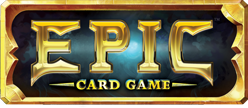
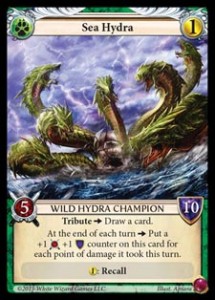

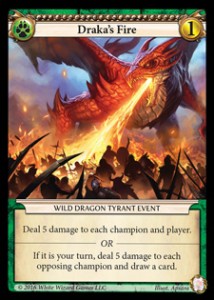
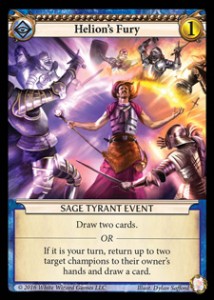
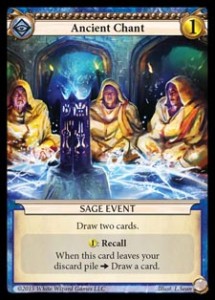
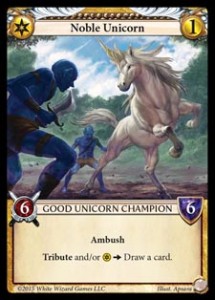
Recent Comments